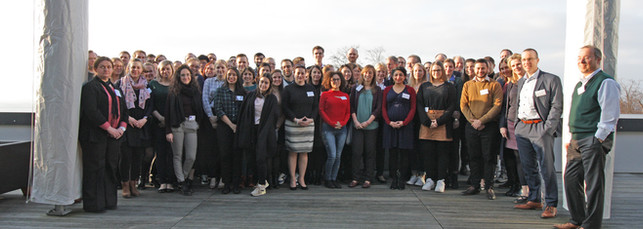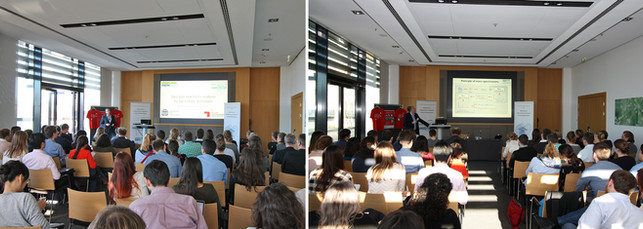
Dr. Heidi Noels and Dr. Yvonne Döring receive the W.H. Hauss Award from the DGAF
19-21 April 2018
Dr. Heidi Noels from the Institute for Molecular Cardiovascular Research at RWTH Aachen University together with Dr. Yvonne Döring from the Institute for Prophylaxis and Epidemiology of Circulatory Diseases at LMU Munich together received the DGAF W.H. Hauss Award 2018 from the German Society for Atherosclerosis Research (DGAF) during the 32nd Annual Meeting of the DGAF in Rauischholzhausen, Germany. They were awarded for their publication "Vascular CXCR4 Limits Atherosclerosis by Maintaining Arterial Integrity: Evidence From Mouse and Human Studies." (Circulation. 2017; 136: 388-403). In this work it could be shown that vascular CXCR4 has an atheroprotective function by maintaining the arterial integrity and preserving the endothelial barrier function. In addition, CXCR4 stabilizes a contractile smooth muscle cell phenotype. Targeted enhancement of these CXCR4-mediated protective functions could open up novel therapeutic options in the treatment of atherosclerosis.
The award was sponsored by a long-standing active member of the DGAF, Prof. Dr. Winfried März.
Project area Z
Administrative project
Robert Werner Mertens
MD student
University Hospital RWTH Aachen
Department of Internal Medicine
Project: The role of incretin hormone GLP-2 in septic cardiomyopathy
PI: Michael Lehrke
Robert Werner Mertens
MD student
University Hospital RWTH Aachen
Department of Internal Medicine
Project: The role of incretin hormone GLP-2 in septic cardiomyopathy
PI: Michael Lehrke
Consortium


Mechanisms of Cardiovascular Complications
in Chronic Kidney Disease
The SFB/TRR219 is supported by the German Research Foundation (DFG)
Project-ID 322900939

NEWSLETTERS RDM
This letter guides readers on how to efficiently name and organize research data, stressing the significance of consistency. It covers naming conventions and data structuring for seamless collaboration.

This letter guides readers through the intricacies of password management, emphasizing the importance of robust strategies for digital security. From tips on crafting strong passwords to recommendations for reliable password management tools.

This letter guides readers through the importance of data sharing in research, emphasizing the role of Creative Commons licenses in facilitating transparent and equitable sharing practices. It addresses sharing one's own data, utilizing external data, and overcoming different barriers.

This letter guides readers through the essential aspects of implementing the FAIR principles to ensure research data is Findable, Accessible, Interoperable, and Reusable. It covers practical steps for making data FAIR, the distinction between FAIR and open data, and highlights tools and platforms like Zenodo and Coscine that facilitate this process.

We are pleased to share the key takeaways from our latest workshop, where we explored the integration of Research Data Management (RDM) into DFG project proposals. This session offered valuable insights and practical guidance, addressing common questions to help consortium members better navigate this critical aspect of their applications.

Coming soon... (#11)
The next newsletter will be released at the end of November.

This letter guides readers on version control strategies and tools for efficient file tracking, including Git-based platforms like GitHub or GitLab, outlining advantages like infinite undos, branching, and collaboration.

This letter guides readers through the systematic approach of Johnny.decimal, offering practical steps to implement this organizational method effectively. By exploring the advantages, starting steps, and additional resources provided, readers will gain valuable insights into structuring and managing their data with clarity and efficiency.

This letter guides readers through the creation and maintenance of a Data Management Plan (DMP) for research project. It highlights the benefits of planning, documenting, and consistently updating your research data using the Research Data Management Organizer (RDMO) tool.

This letter guides readers through latest developments in Research Data Management (RDM) at SFB/TRR219, including updates on Data Management Plans, the implementation of eLabJournal, and upcoming events. It also highlights our ongoing efforts to improve RDM practices and foster collaboration across the consortium.

This letter guides users through the essentials of data preservation, from careful planning and choosing compatible formats to maintaining detailed documentation and metadata. It highlights the steps needed to ensure data remains accessible and usable over time, including creating a data management plan, choosing recommended storage formats, and documenting data generation and analysis procedures.

Images designed by rawpixel.com / Freepik, stories / Freepik, pikisuperstar / Freepik, upklyak / Freepik











